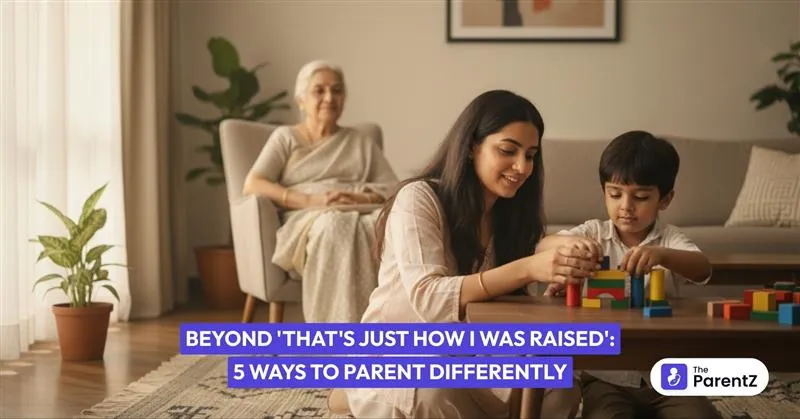There's a child sitting at the dinner table right now, being compared to the neighbor's kid who scored higher marks. There's another being told they're the reason their parents are stressed. Another is hearing "we regret having you" after a small mistake. And somewhere, a parent is defending all of this with four words: "That's just how I was raised."
Here's the truth nobody wants to hear: that excuse isn't protecting tradition. It's protecting trauma.
The Real Cost of "I Turned Out Fine"
Let's be honest. Did you actually turn out fine? Or did you just learn to live with the fear, the constant criticism, the guilt trips? Did you turn out fine, or did you just learn how to survive?
Many Indian middle-class children face pressures that count as toxic parenting. Most parents truly believe they're doing what's best. The problem isn't a lack of love. The problem is that what got passed down as "parenting" was actually survival tactics from people who were never taught how to connect emotionally.
Think about it. Many of today's parents grew up in tough times where their own parents ruled with fear. They weren't raising children. They were copying what was done to them, calling it culture, calling it discipline, calling it love.
The Good News: Things Are Changing
Right now, many parents want more patience. Parenting today focuses on emotional understanding, teaching kids to handle emotions through connection rather than punishment.
This isn't about being "soft." This is about recognizing that fear-based parenting creates adults who either copy that fear or rebel against all rules. Neither is what any parent actually wants.
5 Ways to Parent Differently (And Actually Mean It)
1. Recognize Your Triggers, Own Your Trauma
Your child spills milk. Your immediate reaction is disproportionate rage. That's not about the milk. That's about something in your past. Becoming self-aware means acknowledging parts of your personal history you haven't wanted to face, recognizing signs and symptoms of trauma as the first step to healing.
Start here: Notice when your reaction feels bigger than the situation. Pause. Ask yourself: "What is this really about?" Your childhood is yours to heal, not your child's to inherit.
2. Stop the Comparison Game Immediately
Toxic parents exist in constant competition, regularly comparing and measuring children against others. Every time you compare your child to someone else, you're telling them they're not enough as they are.
Instead: Celebrate what makes your child unique. Notice their specific strengths. When you catch yourself about to make a comparison, say something specific about your child instead: "I noticed how patient you were today" beats "Why can't you be more like your cousin" every single time.
3. Replace Emotional Blackmail with Honest Communication
"After all I've done for you." "We sacrificed everything." "You're killing us with stress." These aren't conversations. They're weapons.
Try this: Gentle parenting removes shame, blame, punishment, and threats, instead encouraging compassion, empathy, and respect while welcoming emotions. Say what you actually mean: "I'm worried about your grades because I want you to have opportunities" is honest. "You're destroying our family name" is manipulation.
4. Set Boundaries With Love, Not Fear
There's a massive difference between "Do this because I said so, and if you don't, I'll make you regret it" and "This is the boundary because here's why it matters, and here's what happens if you cross it."
Today's parents are putting strong boundaries and limits in place, giving children a roadmap for their behavior and expectations without resorting to fear tactics. Your child should respect boundaries because they understand them and trust you, not because they're terrified of you.
5. Model Emotional Regulation Instead of Demanding It
You can't scream at your child to stop crying. You can't lose control and then punish them for doing the same. Emotion dysregulation is a key mechanism linking caregivers' mental health with parenting behaviors that reflect rejection of the child.
Pro Tip: When you're overwhelmed, say it: "I'm feeling really frustrated right now. I need five minutes to calm down." Show them what healthy emotional processing looks like. They'll learn more from watching you manage your emotions than from a thousand lectures about managing theirs.
The Hard Truth About Change
Changing how you parent means facing why you parent the way you do. It means accepting that some of what was done to you was wrong, even if the people doing it loved you. It means knowing that love and harm can come from the same hands.
This isn't about blaming your parents. This is about not becoming them in the ways that hurt.
Your parents did the best they could with what they had. But you? You have information they never had. You have words for emotions that they were taught to hide. You have choices they never knew existed.
Conclusion
"That's just how I was raised" is not a parenting style. It's an excuse to avoid the hard work of healing.
Every time you choose differently, you're not just changing your child's experience. You're changing every generation that comes after.
Your child deserves a parent who chooses to heal rather than repeat. Who chose growth over comfort. Who chose to look at their own pain and say, "This ends with me."
That's not betraying where you came from. That's honoring what you survived by making sure your child doesn't have to survive the same things.
The question isn't whether you turned out fine. The question is: Will your children have to say the same thing someday, or will they say something better?
"My parent loved me enough to break the cycle."
That's the legacy worth leaving.





Be the first one to comment on this story.